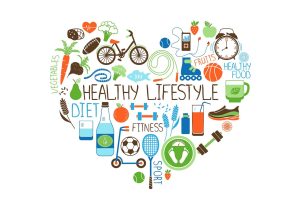The Ultimate Guide to Achieving a Balanced and Healthy Lifestyle

In today’s fast-paced world, maintaining a balanced lifestyle can feel like a challenging endeavor. With an overflowing schedule, it’s often easy to prioritize tasks that seem urgent over those that nurture our well-being. However, achieving balance is not just a luxury; it’s essential for overall health and happiness.
- The Ultimate Guide to Achieving a Balanced and Healthy Lifestyle
- The Need for Balance
- Importance of a Balanced Lifestyle
- Impact on Physical Health
- Impact on Mental Well-being
- Nutrition and Diet
- Importance of a Balanced Diet
- Healthy Eating Habits
- Exercise and Fitness
- Different Types of Exercises
- Incorporating Physical Activity into Daily Routine
- Mental Health and Stress Management
- Strategies to Reduce Stress
- Importance of Mental Health Awareness
- Quality Sleep
- Benefits of Good Sleep
- Tips for Improving Sleep Quality
- Hydration and Its Role
- Importance of Staying Hydrated
- Healthy Beverage Choices
- Social Connections and Relationships
- Building a Supportive Network
- Importance of Healthy Relationships
- Time Management and Prioritization
- Setting Realistic Goals
- Effective Time Management Strategies
- Self-care Practices
- Importance of Self-care
- Self-care Activities for a Balanced Lifestyle
The Need for Balance
Everyone’s journey towards a balanced lifestyle is unique. For some, it may mean cultivating healthier eating habits, while for others, it might be about finding time for relaxation amidst a busy work life. Consider this:
- Physical Health: Neglecting exercise can lead to fatigue and illness.
- Mental Well-being: Stress often arises when we fail to balance work and personal life.
- Social Connections: Isolation can affect emotional health.
This article will explore various elements of a balanced lifestyle, guiding you through the essential components that can transform your daily routine into a holistic experience. Embracing these practices can lead to a more fulfilling and vibrant life.
Importance of a Balanced Lifestyle
Having laid the groundwork for understanding the necessity of balance, it’s essential to delve deeper into its significance. A balanced lifestyle impacts both physical health and mental well-being, often in ways that can dramatically improve one’s quality of life.
Impact on Physical Health
When physical health is prioritized within a balanced lifestyle, an individual often experiences:
- Increased Energy Levels: Regular exercise and nutritious foods lead to greater vitality.
- Disease Prevention: A healthy diet and active life can reduce the risk of chronic diseases.
- Better Weight Management: Balance aids in maintaining a healthy weight through sustainable habits.
For example, after switching to a nutrient-rich diet, one might notice improved stamina during daily activities.
Impact on Mental Well-being
Mental health is equally significant. In a balanced lifestyle, individuals may find:
- Reduced Stress Levels: Healthy routines foster resilience against stress.
- Improved Mood: Regular physical activity releases endorphins, enhancing happiness.
- Greater Focus and Clarity: A well-balanced diet supports cognitive function, leading to better decision-making.
Reflecting on personal experiences or observing changes in oneself can make it clear that balance is not merely an aspiration but a crucial foundation for a thriving, enriching life.
Nutrition and Diet
Having established the importance of a balanced lifestyle for physical health and mental well-being, it’s time to explore how nutrition and diet play a pivotal role in achieving that balance. After all, what we consume directly influences our energy levels, mood, and overall health.
Importance of a Balanced Diet
A balanced diet fuels the body and mind, providing the nutrients necessary for optimal functioning. Key benefits include:
- Enhanced Immune Function: A diet rich in fruits and vegetables helps fend off illnesses.
- Sustained Energy Levels: Complex carbohydrates paired with protein keep energy levels stable throughout the day.
- Improved Weight Management: Proper nutrition helps maintain a healthy weight without the need for extreme dieting.
For instance, a close friend of mine switched from processed foods to whole foods, and the transformation in her energy and clarity was remarkable.
Healthy Eating Habits
Implementing healthy eating habits doesn’t have to be overwhelming. Consider these practical tips:
- Plan Meals: Taking the time to meal prep can save you from last-minute unhealthy choices.
- Stay Hydrated: Drinking enough water plays a huge role in energy levels and appetite control.
- Mindful Eating: Focusing on meals without distractions promotes healthy portions and better enjoyment.
By making small, thoughtful adjustments, anyone can create a nutritious foundation for a balanced lifestyle, supporting both their physical health and emotional well-being.
Exercise and Fitness
With a solid understanding of nutrition and its impact on a balanced lifestyle, it’s essential to focus on exercise and fitness, which together create a powerful synergy for health. Regular physical activity is key for enhancing everything from mood to muscle tone.
Different Types of Exercises
Diversity in exercise routines can keep things engaging and effective. Here are some types to consider:
- Cardiovascular Training: Activities like running, swimming, and cycling increase heart health and stamina.
- Strength Training: Lifting weights or doing bodyweight exercises builds muscle and improves metabolism.
- Flexibility and Balance: Yoga and stretching routines enhance overall flexibility and prevent injuries.
For example, incorporating yoga into a busy week can not only improve flexibility but also serve as a great stress reliever.
Incorporating Physical Activity into Daily Routine
Finding opportunities for movement throughout the day can be simple. Here are some ideas:
- Active Commuting: Walking or biking to work instead of driving boosts daily activity levels.
- Desk Exercises: Incorporating short stretches or standing meetings at the office can combat the sedentary lifestyle.
- Family Activities: Engaging in outdoor activities with loved ones, like hiking or biking, makes exercise more enjoyable.
By thoughtfully weaving physical activity into daily life, individuals can foster a more active lifestyle that complements their nutrition efforts, leading to enhanced overall health and well-being.
Mental Health and Stress Management
With physical fitness and nutrition firmly established as pillars of a balanced lifestyle, it’s crucial to address mental health and effective stress management. As stress levels rise in today’s fast-paced world, finding ways to cope becomes essential for overall well-being.
Strategies to Reduce Stress
Implementing effective stress reduction strategies can make a significant difference in how we handle daily challenges. Here are some practical techniques:
- Mindfulness Meditation: Practicing mindfulness can help clear the mind, enhance focus, and provide emotional relief.
- Time Outdoors: Spending time in nature has been shown to lower stress hormones and increase feelings of tranquility.
- Physical Activity: Engaging in exercise not only improves physical health but has also been proven to reduce stress levels.
Personally, I’ve found that a daily 15-minute walk can work wonders for my mindset.
Importance of Mental Health Awareness
Recognizing the importance of mental health is vital in eliminating stigmas and encouraging open conversations. Awareness helps:
- Promote Understanding: Educating ourselves and others nurtures a supportive environment for those struggling.
- Encourage Help-Seeking: Recognizing the signs of mental distress can empower individuals to seek help when needed.
- Foster Resilience: Acknowledging that mental health matters equips people with tools to cope better during challenging times.
By embracing these approaches, we empower ourselves and others to prioritize mental health in the journey toward a balanced lifestyle.
Quality Sleep
Having explored the crucial aspects of mental health and stress management, it’s now time to uncover the vital role that quality sleep plays in maintaining a balanced lifestyle. Sleep is often underestimated, yet it is fundamental to both physical and mental well-being.
Benefits of Good Sleep
Good sleep quality provides numerous benefits that can enhance daily life, including:
- Improved Cognitive Function: Adequate sleep helps sharpen focus, memory, and problem-solving abilities.
- Better Emotional Regulation: Quality sleep promotes mood stability, reducing the likelihood of irritability and anxiety.
- Enhanced Physical Health: Sufficient sleep aids in muscle recovery and strengthens the immune system.
For instance, I’ve noticed that after a full night’s rest, I tackle the day’s challenges with much greater clarity and calmness.
Tips for Improving Sleep Quality
Implementing effective sleep strategies can lead to restful nights. Consider these tips:
- Create a Sleep Routine: Going to bed and waking up at the same time every day helps regulate your body clock.
- Limit Screen Time: Reducing exposure to screens in the evening can significantly improve melatonin levels for better sleep.
- Optimize Your Sleep Environment: Keeping a cool, dark, and quiet room can create an ideal space for restful sleep.
By prioritizing sleep and adopting these practices, individuals can greatly enhance their overall well-being, creating a strong foundation for a balanced lifestyle.
Hydration and Its Role
After recognizing the significance of quality sleep, another crucial aspect to focus on is hydration. Staying properly hydrated nourishes not only our bodies but also our minds, making it an essential component of a balanced lifestyle.
Importance of Staying Hydrated
Hydration plays a vital role in various bodily functions, leading to numerous benefits, such as:
- Optimal Physical Performance: Adequate fluid intake helps improve endurance, strength, and overall exercise performance.
- Enhanced Cognitive Function: Staying hydrated can sharpen concentration and prevent fatigue or headaches.
- Support for Digestion: Water aids in digestion and nutrient absorption, promoting a healthy digestive system.
I personally find that after sipping on water throughout the day, my energy levels seem to surge, making me feel more alert.
Healthy Beverage Choices
Making conscious choices about beverages is essential for staying hydrated. Here are some options to consider:
- Water: The best choice for hydration, and adding slices of lemon or cucumber can enhance its appeal.
- Herbal Teas: Naturally caffeine-free options can provide warmth and flavor while hydrating the body.
- Coconut Water: A delicious alternative that provides electrolytes, making it especially refreshing post-exercise.
By emphasizing hydration and making mindful beverage choices, individuals can significantly boost their health and vitality, further contributing to their balanced lifestyle.
Social Connections and Relationships
Having addressed the importance of hydration, it’s essential to explore how social connections and relationships shape our overall well-being. Building and nurturing relationships is fundamental to creating a balanced lifestyle that supports both mental and emotional health.
Building a Supportive Network
Creating a supportive network involves surrounding yourself with positive influences and friends who encourage growth. Here’s how to build that network:
- Engage in Community Activities: Joining clubs or participating in community events can introduce you to like-minded individuals.
- Prioritize Communication: Regular check-ins with friends and loved ones can strengthen connections and offer mutual support.
- Be Open to New Connections: Attend workshops or events outside your comfort zone to meet new people.
For instance, I made several close friends by participating in a local hiking group, which has turned outdoor adventures into cherished social experiences.
Importance of Healthy Relationships
Healthy relationships can significantly influence our mental well-being:
- Emotional Support: Positive relationships provide a safety net during challenging times, allowing for emotional sharing and comfort.
- Increased Happiness: Surrounding yourself with supportive people can greatly enhance feelings of joy and belonging.
- Personal Growth: Healthy connections often encourage constructive feedback and personal improvement.
Ultimately, cultivating meaningful relationships is a key ingredient in achieving and maintaining a balanced lifestyle that nourishes both heart and mind.
Time Management and Prioritization
With the significance of social connections and relationships fully explored, it’s time to turn our attention to another critical factor in achieving a balanced lifestyle: effective time management and prioritization. These skills empower individuals to make the most of each day, ultimately leading to greater fulfillment.
Setting Realistic Goals
The first step in mastering time management is setting realistic and achievable goals. Consider these guidelines:
- Be Specific: Clearly define what you want to accomplish rather than leaving goals vague.
- Break It Down: Divide larger goals into smaller, manageable tasks to avoid feeling overwhelmed.
- Time-bound: Set deadlines for your goals to create a sense of urgency.
For example, instead of simply stating, “I want to exercise more,” try “I will walk for 30 minutes each evening after dinner.”
Effective Time Management Strategies
Once goals are in place, employing practical time management strategies can help you stay on track:
- Prioritize Tasks: Use tools like the Eisenhower Matrix to differentiate between urgent and important tasks.
- Schedule Wisely: Allocate specific time slots for tasks in a planner or app to ensure you stay organized.
- Limit Distractions: Identify and minimize interruptions that hinder productivity, such as excessive phone use or social media scrolling.
By honing these skills, individuals can achieve better balance in their lives, seamlessly juggling personal, work, and social commitments without feeling overwhelmed.
Self-care Practices
Having navigated the strategies for effective time management and prioritization, it’s essential to highlight the role of self-care in achieving a balanced lifestyle. Self-care is not just a trend; it’s a fundamental practice that allows individuals to recharge and maintain their mental, emotional, and physical health.
Importance of Self-care
Prioritizing self-care can lead to numerous benefits, including:
- Stress Reduction: Taking time for oneself helps alleviate stress and prevents burnout.
- Enhanced Productivity: When individuals feel rejuvenated, they are more focused and efficient.
- Emotional Well-being: Self-care practices promote positive emotions and greater resilience against challenges.
For instance, I’ve experienced firsthand how dedicating time for a relaxing bath or an engaging book can significantly uplift my mood after a long day.
Self-care Activities for a Balanced Lifestyle
Incorporating self-care into your routine doesn’t have to be complicated. Here are some easy activities to consider:
- Mindfulness or Meditation: Spend a few minutes each day in silent reflection or guided meditation to center your thoughts.
- Physical Movement: Whether it’s yoga, dancing, or a simple walk, moving your body invigorates both mind and spirit.
- Creative Outlets: Engaging in hobbies like painting, writing, or cooking can be therapeutic and fulfilling.
By embracing self-care practices and acknowledging their importance, individuals can cultivate a healthier, more balanced lifestyle that fosters joy and well-being.





